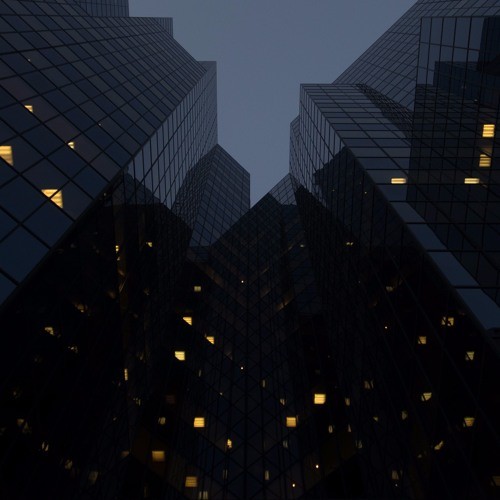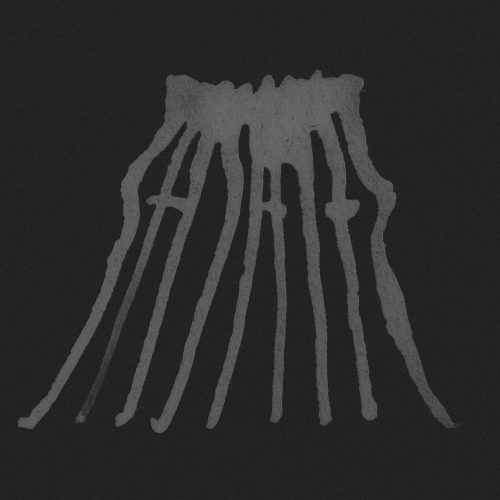More than three years ago the Montréal black metal band Basalte released a debut album named Vestige that hit me like a bolt from the blue. It affected me so strongly that I did what I have a tendency to do when experiencing such episodes of euphoria — I launched into a spontaneous spate of metaphors (here):
“Vestige consists of three long songs (from 9 minutes to almost 17), ‘Mirage’, ‘Luminaire’, and ‘Obtuse’. They are guitar manifestos, strange journeys across distortion-shrouded alien soundscapes that sometimes seem like the eruption of volcanos on a Saturnian moon and then at other times shine like the Saturnian rings themselves, shimmering with the glint of sunlight on ice crystals. The drumming is just as unpredictable and just as transfixing, like a comet with a mind of its own that moves around and through the cosmic lightshow, heedless of the pull of gravity.”
I didn’t stop there, but the subject of this post isn’t a reminder of Vestige but an introduction to Basalte’s new album Vertige, which is being released today, and which you can stream after the bulwark of paragraphs I’ve written on this occasion. I’m not surprised I’ve become euphoric again; I am surprised that Vertige not only reaches the heights of its predecessor but exceeds them.
As was true of the previous album, the new one is devoted to long-form compositions — four tracks that range in length from nearly 9 minutes to 15 minutes. Beyond that, the album itself can be thought of as a single 51-minute suite presented in four movements. Each song easily stands alone, but they flow into each other seamlessly, maintaining the album’s persistent rise and fall.
The music is an intensely emotional form of atmospheric black metal, meticulously constructed and beautifully performed. Interwoven within this striking skein are other musical ingredients, which to my ears seem inspired by post-rock and gloomy post-punk, among others. Whatever genre labels one might choose to invoke besides black metal, the resulting amalgam is completely captivating.
I mentioned the album’s persistent rise and fall, and I meant two things by that. First, Basalte are devoted to progressions in which the power and intensity of the music build, crest in dramatic crescendos, and then subside, only to begin building again. Even those seamless transitions from the ending of one song to the beginning of the next follow that pattern.
But this is only a broad outline, because Basalte don’t repeat themselves very much — it’s not as if they’re just alternating the same two musical sequences within a track. With the ebb and flow comes change, and the changes are part of why they succeed in holding the listener in such an electric grip all the way through songs of such considerable length.
I referred to the album’s rise and fall in a second sense: The darker sides of human emotion hang over almost every minute of the album, but the emotional impact of the music reaches across that bleak spectrum, plumbing depths of anguish and despair in devastating fashion, and rising up in passages of fierce resurgence, and futile resistance to the extinction that confronts us all.
Through it all, across the passages of wrenching anguish, funereal despondency, and soaring defiance, Basalte demonstrate a knack for creating immediately appealing melodic hooks — almost more than you can count. They have a penetrating vibrancy even when the music is at the nadir of its speed and power, and they often reach heights of incandescent grandeur at the zeniths.
The music seems mainly instrumental, in part because the vocals aren’t a constant companion and in part because when they appear, they’re set back in the mix. But they aren’t unnecessary to the mission. Those piercing shrieks of torment, pain, and madness add to the intensity of the songs — and ironically they reach their own zenith of intensity in a part of the 15-minute closing track, “Éclat de verre” right after a storm of sound has broken, when not much more is going on than a faint ambient shimmer and widely spaced strummed chords. And in that space, what you hear captures the sound of isolation, desolation, and defeat.
The drum-and-cymbal work on the album is ingeniously crafted and performed with great skill. It plays a vital role in that pattern of changing movements. The bass work is similarly inventive and skillful, a further reflection of the care devoted by the band to achieving their vision.
But the guitarist (or guitarists?) shines the brightest, and of course is (are?) most responsible for the music’s shifting moods — the howling into the void, the wistful longing, the looming of a grim majesty that portends the downfall, the frenzy of emotional trauma, the last gasps for help, the shedding of tears in the staggering march to a grave.
At one moment in the final track you encounter a guitar melody that sounds playful, over a skipping drum rhythm. That might be the only passage on the album that recalls a time of innocence and hope. But there are many other times when the melodies glimmer and shine, when the music becomes beautiful… but it’s a melancholy beauty that stands revealed.
I’ll end my own expressions of euphoria now and leave you to the music. I hope you’ll find the album as fantastic as I have. It’s available on Bandcamp, and, astoundingly, it’s available for a price you choose, or for free. But I hope everyone showers these people with money in gratitude for this remarkable gift.
Bandcamp:
http://basalte.bandcamp.com
Facebook:
https://www.facebook.com/projetbasalte



unbelievably wonderful bm context and excellent instrumentation of superior musicianship and songwriting, which is harder to find in the overflowing sea of releases.
many influence from epic doom like StS and also audible Krallice/BAN tremolo-gaze!!
Very glad you have such a good appreciation for what they have done here!
THIS MAKES IT MOIST. OR HARD. SO GOOD. EARLY AOTY TYPE STVFF HERE.
Incredible Album!!